Content marketing has been one of the most popular and most effective ways to attract and convert leads for a very long time. You probably already have a shrewd idea of how to use keyword research to find relevant topics for your business.
However, there’s much more to writing engaging posts than choosing the best keywords. As your goal isn’t merely to rank but also to build relationships and incentivize readers to take action, there are many other tactics you can utilize.
Let’s explore how to choose topics that will resonate and how to distill them into great titles that will inspire clicks, opinions, and shares.
Identify Trending Topics via Topical Social Media Conversations
Social media is probably the best place to gauge the interests and concerns of your target audience. This is where they will express their opinions most freely, ask questions, and look for advice from their peers.
By identifying relevant hashtags, influencers, and accounts, you can keep an eye on the topics that are engaging your target audience. When these topics happen to be something you can comment on, don’t miss the opportunity to write about them.
For a great example, check out Clockify’s post on quiet quitting. They’ve identified this is a topic that is trending among employees everywhere. So, they’ve capitalized on it by writing an in-depth guide about it.
Clockify kept the title simple and effective; you instantly know you’ll learn what the term actually means and how you can quietly quit in your own line of work.
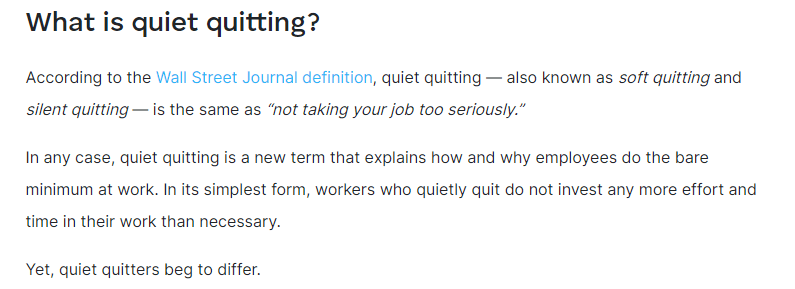
Leverage Your Personal Experiences
Don’t underestimate the knowledge and experience you already have when choosing relevant blog topics. As you’ve developed your product or service, you’ve gotten to know your audience’s pain points and how to solve them. Sharing some of that knowledge can be a great marketing tactic.
Don’t be afraid to be highly personal, offer your opinion, and write in detail about your experiences. This will make your posts more relatable and valuable, as readers will be able to learn from your mistakes and processes.
Check out this post on the best LinkedIn automation tools. It is long, detailed, and interspersed with the writer’s own results and setbacks with automation. It was clearly written by someone who has actually used these tools, as opposed to a hired hand who writes about assigned topics.
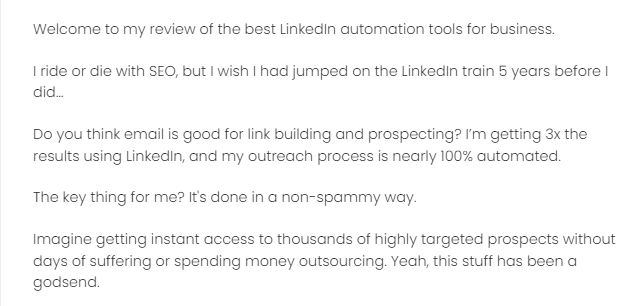
Note that you may attract naysayers or those who don’t agree with your opinions, but that’s perfectly fine. You can never please everyone, but those who appreciate your point of view are likely to stick around.
Position the Post as an Evergreen Resource
Publishing evergreen content will help your brand establish itself as a credible and valuable source of information. However, as there can sometimes be a limited number of evergreen topics you can reasonably write about, you can also put an evergreen spin on a wide range of topics.
Let’s look at this checklist for ecommerce due diligence as an example. Simply by calling the article a checklist, the author manages to add an important layer of perceived value to it. The reader will be able to see themselves as ticking off these items from their list one by one rather than simply ingesting somewhat dull information.
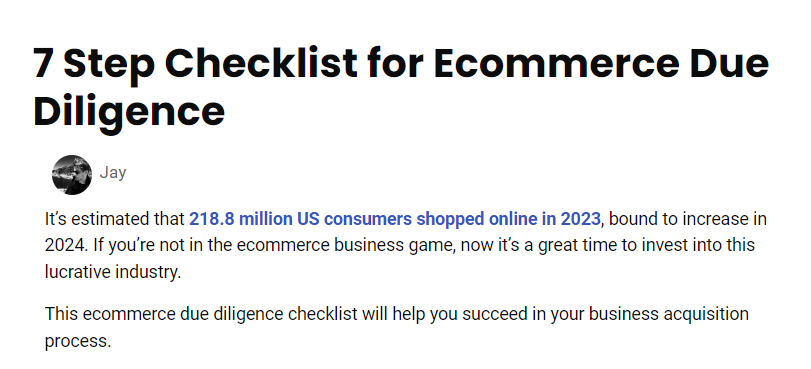
Consider how you can create similar content from even the most mundane topics. Any content format that is at least somewhat interactive will work well. For example, you can include a calculator in your post or add pintables to it.
Mine Your Customer’s Experiences with Case Studies
Case studies are a great content format for improving conversion rates. They will clearly demonstrate to your audience what you do and how you do it. Provided that you write them well, you can also turn them into exceptionally interesting reads.
Aim to make the case study as relatable as possible. Tell the story and history of a customer, and make it easy for the reader to imagine the problem. Show the actual people who’ve had and solved that problem, if possible.
The more tiny personal details you can add to your case studies, the better. Look at Visme’s Denver Broncos case study. It not only talks about a major (and trending) sports team but also clearly outlines the problem and the solution.
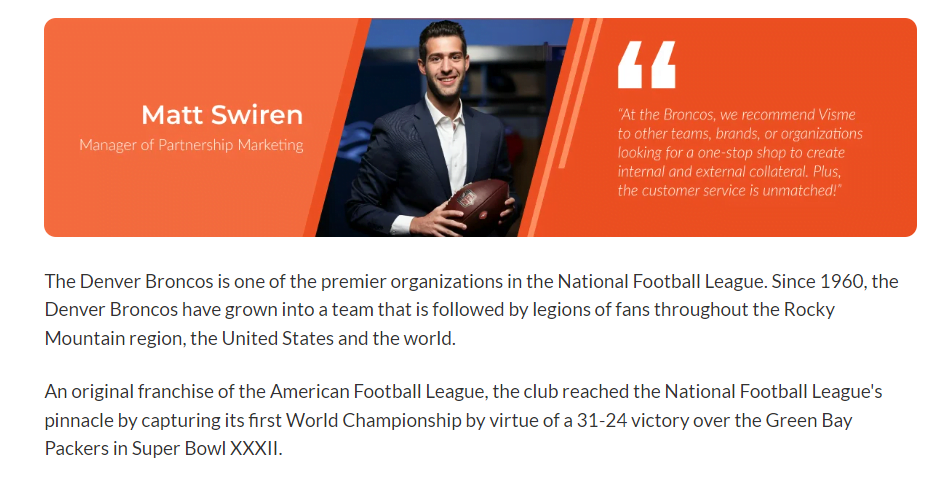
Use case studies to highlight the different benefits a customer will have by doing business with you. Pepper them with all those details that you didn’t already emphasize on your sales pages.
Keep an Eye on Local and Global Events
Much like you should try to keep one eye on the topics your audience is discussing on social media, you should also monitor local and global events that are relevant to your business. Of course, this doesn’t mean you need to offer commentary about everything that is going on. Just address key occurrences that will impact the lives of your customers.
For example, Surfer recently published a post on recovering from the latest Google core update. This is a topic that will be of extreme interest to their audience, given the extent of the update and how much havoc it caused.
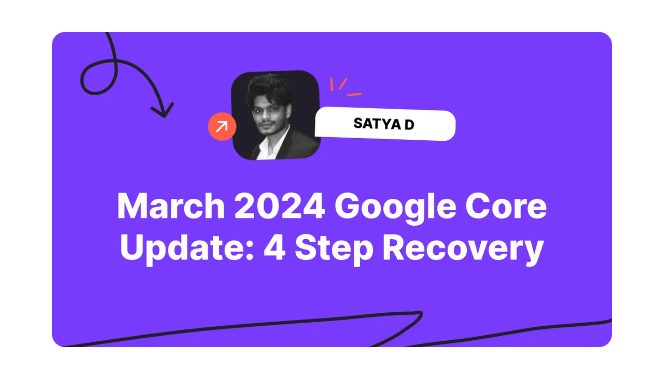
Try to do something similar, and only blog about events that are near and dear to your company. For example, if you are a staunch supporter of animal rights, address any developments in that field, alongside all industry-specific news.
Double Down on Your Audience’s Known Pain Points
Sometimes, you don’t need to spend a lot of time doing keyword research or looking at your competitors’ blogs to figure out what to write about. All you need to do is really double down on the topics you know are of great concern to your audience.
While you’ve probably already covered all the obvious topics, try to take a step back and look at your blog and brand like a customer would. Are there any missing pieces in your content? Can you create posts that are even more in-depth, that offer additional insight? Can you expand on something you’ve already written about?
This post about project planning is a good example of the benefit of taking time to cover certain obvious pain points. It’s one of the brand’s most popular reads, even two years after publication.
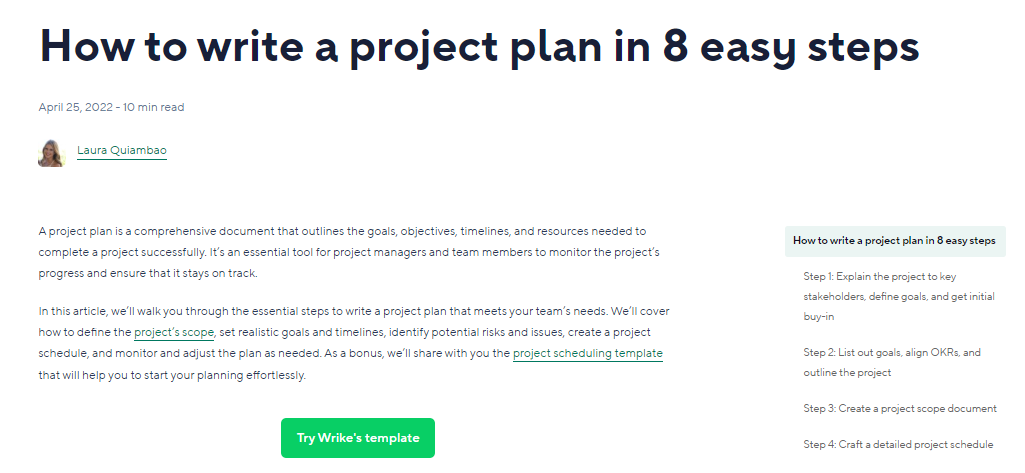
Do you have a similar resource? Could you expand on a topic more? Is there a pain point you have not covered yet?
Get Hyper-Niche with Topic Clusters
In order to stand out as a valuable resource in the eyes of both search engines and readers, you should build out your blog around specific high-level terms. Think of them as the least specific keywords with the biggest monthly search volume. For example, that topic might be SEO in general.
From there, get more and more niche with various topics and sub-topics. For example, you could have an “on-page SEO” niche, then a “keyword research” niche, all the way down to topics like “how to choose keywords for top-of-the-funnel audiences in the hospitality industry.”
This post on white label SEO services is quite niche, for example. It targets both white label services and startups, so it has technically managed to merge two smaller segments into one article.
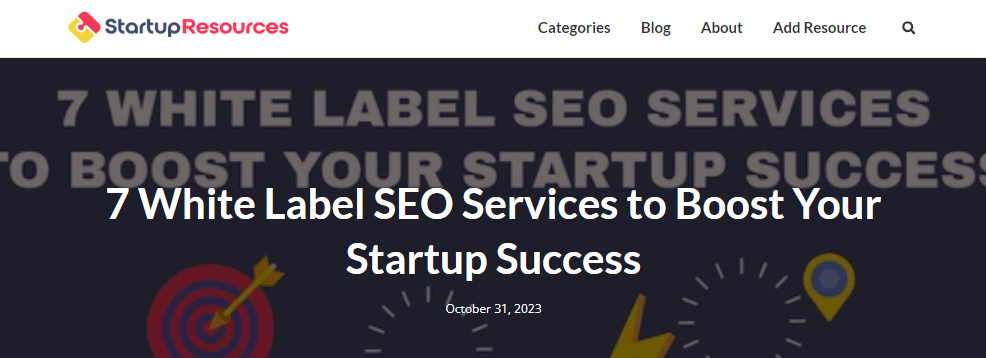
You can reasonably risk writing about super-specific topics as long as you know they are of interest to your audience. Even if they don’t have too many readers, chances are they will be highly interested, ready to engage and convert.
Conduct Your Own Research and Surveys
Publishing exclusive and original information is a great way to capture the attention of your audience and get them involved in the conversation.
There are different ways you can approach this. You can send out a questionnaire to a specific segment of your audience or customer base and then analyze and interpret the data you gather. Alternatively, look at the data you already have about purchasing trends or customer behaviors and distill it down into a case study.
This is a great time to think outside the box and publish something with a twist.
For example, ClickUp did a post about how their team uses their own tool. This is essentially a use case, but it also provides valuable insight into the way the brand works and what features of the product they use and like the most. It’s also a great way to share some insider tips.
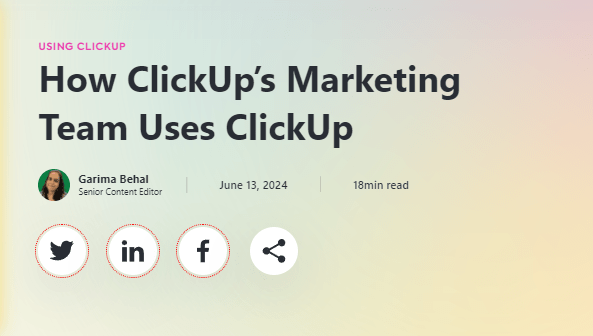
Leverage the Novelty of a Guest Post Author
You don’t have to worry about coming up with all the topics for your blog yourself. You can also capitalize on the interest your blog is certain to gain as soon as you start to grow. Plenty of individuals and companies will offer to write a guest post for you.
Naturally, you shouldn’t accept just about anyone. Make sure that you only publish guest articles written by bona fide experts in your niche and industry, people whose experiences will be of interest to your readers. They can offer new insights or a point of view that you haven’t previously published.
You can also reach out to people yourself, asking them to write for you. Make sure every guest post is clearly labeled as such and that the value of the contribution is highlighted.
For example, if you check out this post about designing site headers, you’ll notice that the author’s bio explains why their opinion matters. There is also a neat note stating the author has been specially selected, giving even more exclusivity to the post.

Become a Hub for Industry-Specific Comparisons
A large portion of your audience will want to compare your product or service with someone else. The best thing you can do is provide an honest, unbiased comparison.
Compare yourself to your main competitors and give them credit where it’s due. Explain what you do well and who you might be a great choice for. Your readers will appreciate the honesty.
You can also compare other products or services in your industry and make quite the name for yourself as a hub of useful insight. This post on due diligence services by Smash.vc is a good example. They don’t have a specific ax to grind — they are merely being informative and offering help to their clients.
Find a niche in your industry you can contribute to in a similar fashion. Make sure you do actually have first-hand experience with the product or service you are talking about as well.
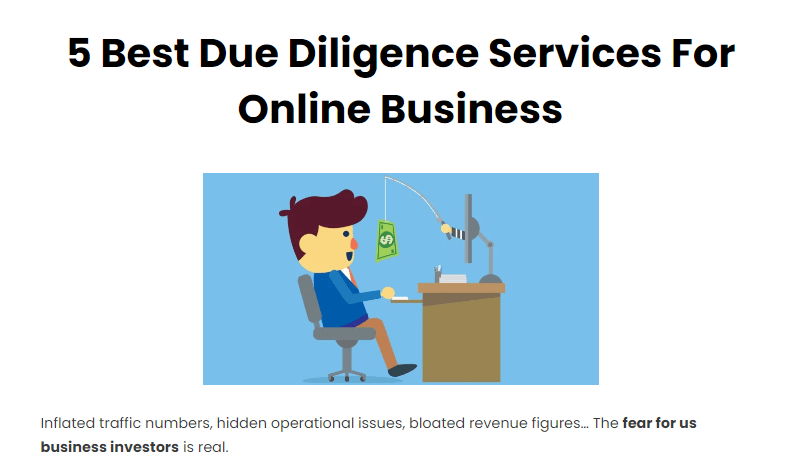
Make a Big Deal of Product Updates
Don’t forget that you can also publish posts that are extremely product-focused. Letting your audience know every time there is a product update will not only fill up your content calendar but also help users stay on top of the latest features.
Ahrefs does a good job with these types of posts. They have an entire section of their blog called “product blog,” where they explain how their product is evolving.
Notice how good the layout of the post is. There is a lot of (useful) text, a screenshot accompanying every new feature, plus a video at the very top, in case you prefer to watch rather than read.
Not everyone will read these posts, but a portion of your audience will appreciate the regular updates. If you involve them in the process even more, asking their opinion on new features and the pros and cons of your current ones, you will pique their interest even more.
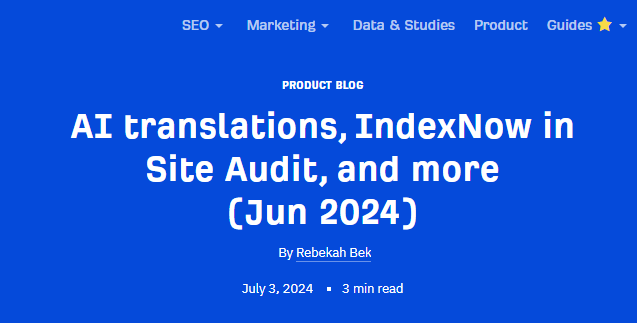
Wrapping Up
Try using some (if not all) of these methods to come up with blog topics and titles that will truly resonate.
Also, don’t forget how important it is to tailor the voice and language you use to your audience. Work on establishing a pleasant rapport, and don’t merely write to convert. Aim to inspire trust and foster long-term relationships.





